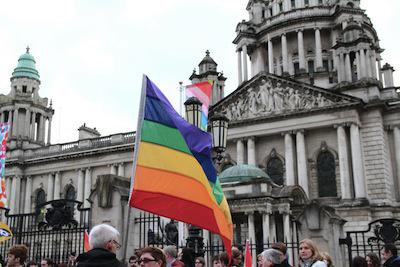
Demonstration in Belfast for equal marriage in Northern Ireland. Demotix/AMMGOfficial. All rights reserved.
The recent decision of the Parades Commission to ban a returning Orange Order parade near an interface area along the Crumlin Road in North Belfast on 12 July, and the heated debate surrounding that decision, has again highlighted the contested nature of cultural expression in Northern Ireland. Nationalist politicians welcomed the decision, whereas unionists and the Orange Order expressed disappointment. Debates in the media concerning this particular decision, and other issues relating to the display of flags in residential areas of Belfast, do not suggest that a compromise is imminent.
Flags and parades are not the only issue that have caused controversy in recent times. Witness the comments about Islam and the Muslim community made by the controversial preacher, Pastor James McConnell, and the support for the pastor initially expressed by the First Minister, Peter Robinson. The events were widely reported throughout the world, and attracted considerable criticism from ethnic minority and religious advocacy groups, and the wider public. Both men have since made full, public apologies.
Perhaps more worryingly, these events have taken place against a backdrop of an increase in hate crimes against members of ethnic minority communities in Northern Ireland, of which the recent targeting of the house of a Nigerian family in East Belfast with “locals only” banners is only one prominent example. Such crimes have regrettably become increasingly common over the past two years. In this, Northern Ireland is not necessarily exceptional. Recent research suggests that there has also been an overall rise in the number of people who admit to having racially prejudiced attitudes in other parts of the United Kingdom, according to the British Social Attitudes Survey (the London region and Yorkshire and the Humber being notable exceptions to the overall trend).
Taken together, these developments arguably represent the outward expression of two different forms of ‘culture war’ taking place within Northern Ireland. This term might not be universally accepted. And perhaps it is too essentializing in its description of the wider tensions that have framed public and political debate in post-conflict Northern Ireland. However, it is used here merely as a way of describing, and attempting to understand, the contemporary social and political events in the region, by using a framework which has been applied to other western societies, particularly the United States.
The first of the two types of ‘culture war’ centres on the conflicts between Irish nationalists and British unionists in Northern Ireland society. Since the advent of the peace process, matters connected to the public expression of cultural identity have become increasingly contested, as evidenced by the almost yearly disputes in some communities about parading, and the ongoing protests against the decision to restrict the flying of the Union Flag to 17 designated days at Belfast City Hall.
The second, and perhaps equally divisive ‘culture war’ has seen divisions emerge on a range of social and moral issues, such as same-sex marriage, reproductive rights and access to abortion, and blood transfusion policy. This second ‘frontline’ highlights the political divisions that reach across the established sectarian divide and pits those from a traditional-conservative background against those identifying more in the secular-liberal tradition.
Discussion concerning the accommodation of ethnic minority communities within Northern Ireland’s new political dispensation reveals a new fracture that highlights the complexities of debates about citizenship and identity in the post-conflict period. These matters may not be easy to resolve, but they can, perhaps, be managed. The BBC recently reported that it had obtained a copy of the Northern Ireland Assembly’s draft racial equality strategy. If such a strategy is delivered, then this must be seen as a positive statement from political leaders of all hues about the unacceptable nature of racism in a modern democracy.
There is, though, a need to adopt more proactive and strident approaches to countering racism and other forms of bigotry and discrimination. Northern Ireland’s political elites must be seen to show leadership and resolve to further reform politics and society in the face of sustained critical attack from declining but still powerful elements within their own communities.
As ever, young people will be central to any process of managing these interconnected problems. In November 2013, we were part of a team that hosted a symposium sponsored by the Political Studies Association on the theme of the "Northern Ireland 'culture wars'" that brought together academics and civil society organisations. The event, summarised in a report sent to members of the Northern Ireland Assembly, highlighted the extent of the work that needs to be done to ensure young people from disadvantaged communities do not become involved in the kind of violent street protests that Northern Ireland has witnessed in recent years. Providing alternative outlets for young people to express their views and grievances in a safe way may help reduce the numbers of those who become involved in violent activity.
Similarly, it will also be crucial to engage young people to ensure that prejudicial attitudes – whether sectarian, racist or otherwise – be tackled at an early stage. At a time when Westminster politicians are expressing the arguably misguided need to inculcate ‘British values’ in young people from minority communities, it is vital that Northern Ireland’s politicians invest in developing citizenship education initiatives in schools and local communities that directly address issues of racial and ethnic discrimination and seek to build knowledge and appreciation of diversity. Failure to engage young people in such a way means the failure to reduce instances of prejudice and sectarianism in a crucial generation.
Read more
Get our weekly email
Comments
We encourage anyone to comment, please consult the oD commenting guidelines if you have any questions.